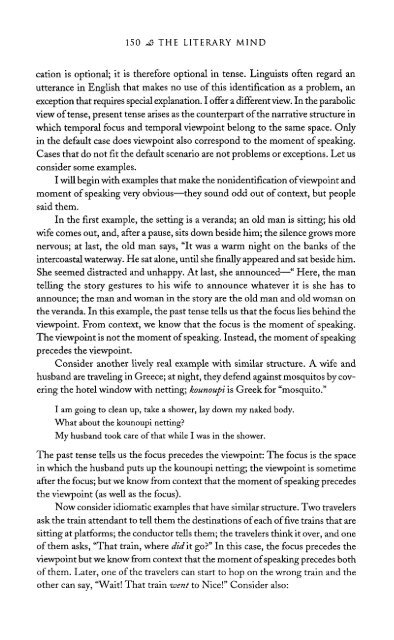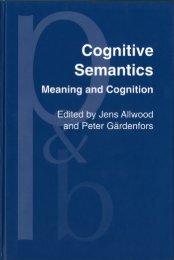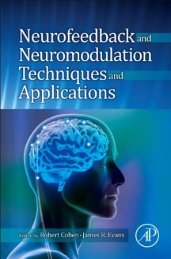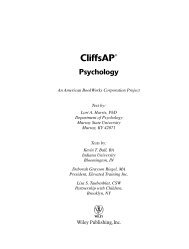The Literary Mind.pdf
The Literary Mind.pdf
The Literary Mind.pdf
You also want an ePaper? Increase the reach of your titles
YUMPU automatically turns print PDFs into web optimized ePapers that Google loves.
150 THE LITERARY MIND<br />
cation is optional; it is therefore optional in tense. Linguists often regard an<br />
utterance in English that makes no use of this identification as a problem, an<br />
exception that requires special explanation. I offer a different view. In the parabolic<br />
view of tense, present tense arises as the counterpart of the narrative structure in<br />
which temporal focus and temporal viewpoint belong to the same space. Only<br />
in the default case does viewpoint also correspond to the moment of speaking.<br />
Cases that do not fit the default scenario are not problems or exceptions. Let us<br />
consider some examples.<br />
I will begin with examples that make the nonidentification of viewpoint and<br />
moment of speaking very obvious—they sound odd out of context, but people<br />
said them.<br />
In the first example, the setting is a veranda; an old man is sitting; his old<br />
wife conies out, and, after a pause, sits down beside him; the silence grows more<br />
nervous; at last, the old man says, "It was a warm night on the banks of the<br />
intercoastal waterway. He sat alone, until she finally appeared and sat beside him.<br />
She seemed distracted and unhappy. At last, she announced—" Here, the man<br />
telling the story gestures to his wife to announce whatever it is she has to<br />
announce; the man and woman in the story are the old man and old woman on<br />
the veranda. In this example, the past tense tells us that the focus lies behind the<br />
viewpoint. From context, we know that the focus is the moment of speaking.<br />
<strong>The</strong> viewpoint is not the moment of speaking. Instead, the moment of speaking<br />
precedes the viewpoint.<br />
Consider another lively real example with similar structure. A wife and<br />
husband are traveling in Greece; at night, they defend against mosquitos by covering<br />
the hotel window with netting; kounoupi is Greek for "mosquito."<br />
I am going to clean up, take a shower, lay down my naked body.<br />
What about the kounoupi netting?<br />
My husband took care of that while I was in the shower.<br />
<strong>The</strong> past tense tells us the focus precedes the viewpoint: <strong>The</strong> focus is the space<br />
in which the husband puts up the kounoupi netting; the viewpoint is sometime<br />
after the focus; but we know from context that the moment of speaking precedes<br />
the viewpoint (as well as the focus).<br />
Now consider idiomatic examples that have similar structure. Two travelers<br />
ask the train attendant to tell them the destinations of each of five trains that are<br />
sitting at platforms; the conductor tells them; the travelers think it over, and one<br />
of them asks, "That train, where did it go?" In this case, the focus precedes the<br />
viewpoint but we know from context that the moment of speaking precedes both<br />
of them. Later, one of the travelers can start to hop on the wrong train and the<br />
other can say, "Wait! That train went to Nice!" Consider also:















